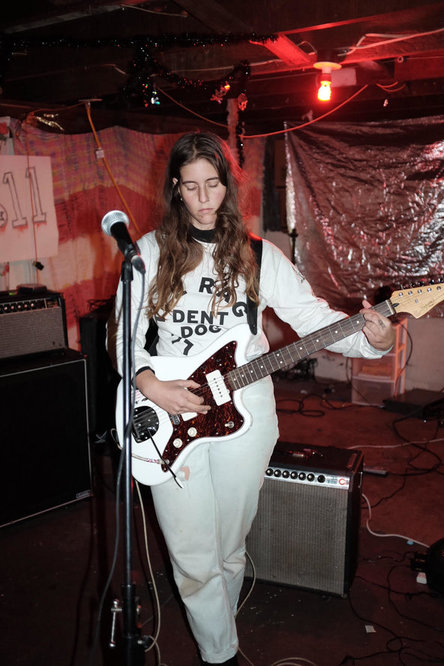Three very different veteran artists (an experimental rocker, an industrial hip hop producer, and a jazz guitarist) offer advice on how to tour on your own terms and successfully navigate the DIY circuit.
_________________________
Guest post by Chris Martins of the Spotify For Artists Blog
Three veterans offer advice for navigating the DIY tour circuit.
There are lots of reasons to plan, book, and run your own tour, foremost among them being not having a choice. After all, booking agents aren’t issued like driver’s licenses — before you begin working with one, you’ll have to prove your mettle. Even then, many artists prefer the DIY lifestyle—from basements and galleries to festivals and clubs, DIY touring is a uniquely brutal grind, but the rewards are singular too.
For Los Angeles’ Sophie Weil, 28, who makes experimental rock via the projects Syko Friend and Olga, it’s about forging a deeper connection with the music: “I’ve been going to house shows since I was a teen. That really informed who I am,” she says. “What’s the point in playing if you’re not involved in the process?”
 Sophie Weil
Sophie Weil
Baltimore-born, Berlin-based industrial hip-hop producer Walter Gross, 33, is in it for the adventure. By playing—and often sleeping over at—non-traditional venues, he says, “You immerse yourself in local subcultures and meet the most interesting and gracious people. It reaffirms your love for humanity.” Meanwhile, Knoxville jazz guitarist Mike Baggetta, 38, who’s in a new trio with punk great Mike Watt and legendary session drummer Jim Keltner, stresses practical perks: “You can see how you fit into —and how to manipulate — the machinery. Plus you get to keep all the money.”
Sounds fun, but the actual “do” part of do-it-yourself touring can be intimidating, so we asked these three pros for their hard-won expertise to demystify the trail less traveled, and help you avoid pitfalls along the way.
First, you’ll need places to play. For our experts, venues run the gamut: living rooms, bars, college campuses, concert halls, anarchist squats, old theaters, book stores, warehouses… you name it. Regardless, the tools are the same. “A map, a calendar, and whatever contacts you’ve got,” says Gross. He and Weil find the most effective strategy is cross-referencing friends’ tours, or tours of bands who make similar music at a comparable level in their career. Find out where they’ve played, ask for introductions, and send emails. “If the person booking the space doesn’t write back, write again. If they still don’t write, call,” says Baggetta. Gross adds, “Brevity is key—boiling your sound and package down so it’s succinct and coherent. People lose interest quick.”
Other rules: when touring with a second artist, pitch short set times (Weil suggests 20 minutes); if you’ve got a lead on a gig, check back weekly till it’s confirmed; finalize bookings three months out; tell your contact ASAP if you need a PA or special equipment (they can help); and don’t take rejection personally—if you’re easy-going, they may connect you to another venue. Weil actually helps touring bands find shows in L.A. “This is happening everywhere and we’re all trading,” she says. If she doesn’t have contacts in a city she’s passing through, she’ll hit Facebook: “Anybody played in Eugene, Oregon?” Aim for weekend work in small towns, Weil adds, and weeknights in major markets where the competition is stiff but people are more apt to go out on a Tuesday.
 Walter Gross
Walter Gross
Now, compensation. Baggetta stresses the importance of thinking about tour income holistically. “It’s all about the anchor gig,” he says. “Something that pays well to cover however many shows nearby that don’t. A concert series or festival may kick in hotel rooms—it’s always worth asking.” Whatever the payment situation, he says, work it out in advance and get it in writing. If it’s a club show, know how much of the door the club keeps. If it’s a house show and they’re gonna pass a hat, make sure that hat gets passed. If there’s a discrepancy the night of, as Gross puts it, “You can punk ’em out and make ’em pay what they don’t have, or let it slide for the sake of decency. This is all labor of love. The shady bookers come out when there’s a lot more money involved.”
Back to lodging. When you’re playing communal spaces, “it’s usually part of the package,” says Gross, but confirm ahead of time nonetheless. If the venue itself isn’t equipped for crashing, ask your contact if anyone involved with throwing the show (even a local act on the bill) can provide a guest room or couch. “Just remember your host is doing you a service,” says Weil, who brings her own food with her. “Make yourself as little of a burden as possible. I usually give them a tape or shirt, or return the favor when they come to L.A.” For obvious reasons, getting good rest can be hard. Baggetta advises budgeting for a motel every few nights—”Look for coupons,” he says—but points out that the rigors of the trip can often strengthen the bonds between bandmates.
Not every challenge of DIY touring is as punk-romantic as losing sleep in a house full of artists and revelers though. “Booking yourself, you don’t have anyone to look out for you,” says Gross. “No merch guy or manager to make sure your shit doesn’t get stolen. You’ve gotta pay attention to everything.” Weil travels with her dog, a shepherd mix named Tupelo, for both companionship and security. “It’s a myth that you can party,” she says. “Enjoy yourself, but have your wits about you and listen to your gut. If you you feel unsafe in a situation, leave.” Baggetta cautions, “If you don’t have all your ducks in a row you are gonna get burned. The cliché of the lazy musician is a thing of the past. Just stay positive when things do go wrong so you can figure out a solution.”
These three have amassed their share of horror stories from the road, separately crossing paths with penniless promoters, empty venues, bed bugs, tear gas, and hurricanes. But do it right and you’ll take home countless memories and a sense of accomplishment that, according to our subjects, you won’t find anywhere else. Baggetta’s learned that even the tiniest gig brings with it the opportunity to have huge impact on a single music lover. Weil gets a thrill out of seeing the puzzle she’s painstakingly built (which is to say, the tour map) come to life and actually work. And Gross, who’s built a European fanbase by throwing himself into the grittiest scenarios of all, sums it up when he says that after a hard day’s tour, he’s left with one feeling: “Rugged glory.”
—Chris Martins